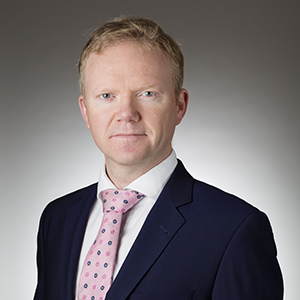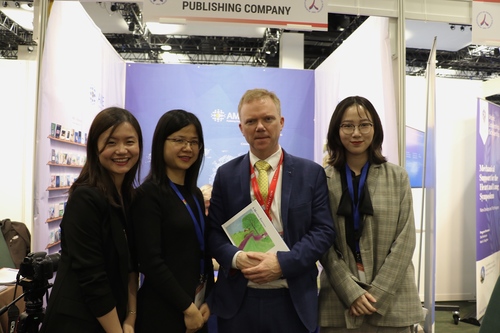Editor’s note
The 27th Annual Meeting of the European Society of Thoracic Surgeons (ESTS) was held on June 09–12, 2019 at the Convention Centre Dublin, in Dublin, Ireland. As the world’s top event in the field of general thoracic surgery, the ESTS annual meeting brings together thousands of experts and scholars from around the world to discuss the hotspots of thoracic surgery, update research progress, and share their experiences. The AME editorial team was with great honor to invite Dr. David Healy to conduct a brief interview during the meeting.

Figure 1 Dr. David Healy.
Expert introduction
Dr. David Healy (Figures 1,2) is the Chair of Local Organizing Committee of the ESTS annual meeting this year. He is currently working as a Cardiothoracic Surgeon and Associate Clinical Professor at the Department of Cardiothoracic Surgery, St. Vincent’s University Hospital, Dublin, Ireland. He specializes in Thoracic Oncology and Minimally Invasive Thoracic Surgery. Dr. Healy received his BSc (Hon) in 1997, his MB MCH BAO (Hons) in 2000 and PhD in 2007 at National University of Ireland, Galway. In addition, he finished his fellowship in Transplantation & Mechanical Circulatory Support at Papworth Hospital, Cambridge, UK [2009–2010] and Thoracic Oncology Fellowship at Sloan Kettering Cancer Center, New York, NY, USA [2010–2011].

Figure 2 Dr. David Healy and the editors at the booth of AME Publishing Company in the venue.
Interview
CCTS: What are the biggest challenges of the Local Organising Committee (LOC)?
Dr. Healy: David Healy is my name, the chair of the Local Organising Committee. I suppose the biggest challenge for us running the European meeting which was given about 2 years ago, is that Ireland is very small, the population here is about 4.5 million, and in total between cardiac and lung surgery there are 19 surgeons, and that provides adult and paediatric services as well as cardiac and thoracic surgery. So, we have a small number of people to get them involved in the organizing, that’s probably the biggest local challenge.
CCTS: For you, what are the most exciting aspects as the chair of LOC?
Dr. Healy: I think the most exciting aspect is the interaction of meeting people directly face to face. We can read books that are really good (I love books), which you can do all by yourself at home. And you can watch maybe videos on TV from your office. But the reason to go for a meeting is to walk around and talk to people, hear their problems, hear their difficulties, share yours, get some new ideas of new research, and I always find when I go home from the meeting like this, I grow more and more excited talking to people with more new ideas.
CCTS: What kinds of topics/researches on the program of this year would you focus your attention on? Why?
Dr. Healy: In my personal practice, oncology is the dominant activity. So, for me, lung cancer is a major focus of my work. Robotic surgery is new and exciting, but it’s relatively expensive. Earlier in the last year, we have got a robot in our department, so I’m interested in meeting people who know robotic surgery. I am also part of a very busy lung transplant service.
CCTS: What sparked your interest to be a thoracic surgeon?
Dr. Healy: When I went to medical school, I always wanted to be a surgeon. In my undergraduate training, I never saw cardiothoracic surgeries. So when I finished University, I didn’t know anything about the true nature of cardiothoracic surgeries. When I was a trainee surgeon, we rotated through many specialties and I was introduced to thoracic surgeries. This specialty pulled together all the various things I learned in terms of physiology, medicine and surgery, and I couldn’t really be interested in any other surgery after being exposed to thoracic surgery.
CCTS: What is the greatest gratification as a thoracic surgeon?
Dr. Healy: I think the greatest gratification is meeting patients after the surgery, knowing that they are doing well. I have transplant patients, who are well and sent us the cards from their holidays and the pictures of their families and kids. I have transplant patient who runs marathons. Similarly on the oncology side, we follow our patients with surveillance and we see how well they are doing after their surgery.
CCTS: What are the major opportunities and challenges that the young generation of surgeons is faced with nowadays?
Dr. Healy: The biggest challenges are related to the opportunities. The biggest challenges are cost, finance and expense. We have great technologies, great treatments, robotic surgeries and intensive cares and great facilities, and all these cost money. And to deliver service to population in a fair and equal manner is very complex and is very hard. So that’s the biggest challenge. For young surgeons coming through training, you all need to learn surgery with robots. That’s really expensive.
CCTS: How should young surgeons and trainees prepare themselves for a better and successful career?
Dr. Healy: I think perhaps young surgeons are coming through with a focus on minimally invasive therapies. I would make sure I’ve learned robotic surgery. I would try if I could get some interventional radiology skills. I think for surgeons, to get some of those skills would be great. And also in the back of my mind, I would make sure to get something very different: I do some business training or management leadership perhaps to make sure that I had skills to work successfully in a busy surgery department.
CCTS: What should the mentors/supervisors do to better prepare the next generation of medical professionals to handle the thoracic diseases?
Dr. Healy: Well, I think, a lot of classic mentor strategies are still valid and still remained. I think, all these mentors are enthusiastic about their job, that’s probably the most important thing. If they are still enthusiastic, there must be something interesting here. I think over years surgeons can get a little bit frustrated. Finance and resources are a constant challenge, but we should not burden our trainees with this.
CCTS: If you are not a thoracic surgeon, what would you like to do?
Dr. Healy: Well, that’s an amazing question. Within the medicine, anything that I am interested might be oncology. And outside the medicine a teacher in a science university would be interesting.
